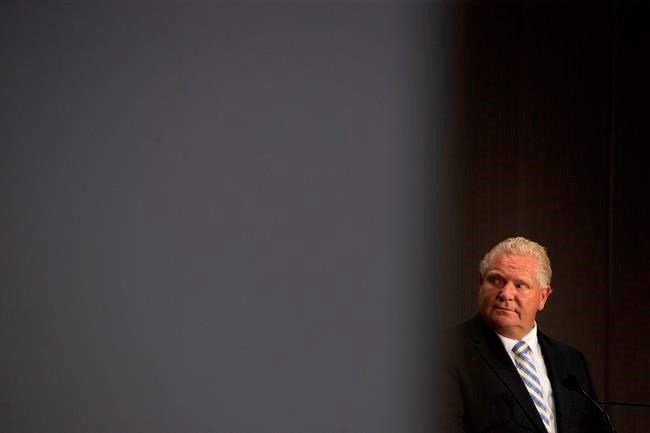OTTAWA — Ontario Premier Doug Ford says the quarantine system is "broken" because federal health officers are not charging people ignoring self-isolation orders for COVID-19.
Since the end of March, an emergency order under the federal Quarantine Act has required most people arriving from outside Canada to isolate themselves for 14 days, even if they don't have symptoms.
While more than 2.5 million border-crossings have been recorded since then, only a fraction of those travellers are ordered to quarantine, while the rest are exempt as essential workers, such as truck drivers, front-line health staff or airline crew.
Those essential workers must not work with anyone over the age of 65 for at least two weeks, and must wear masks if they can't physically distance from others.
If someone breaches a quarantine order, federal quarantine officers can lay charges with penalties of up to six months in jail and fines of up to $750,000, while police can issue tickets of up to $1,000.
Between March 25 and Sept. 3, police have been asked to check on the whereabouts of 87,338 people ordered to quarantine. Data provided by the Public Health Agency of Canada lists zero arrests for ignoring a quarantine order, one summons to appear in court, and 42 police-issued tickets.
The RCMP separately said that in addition to tickets, its officers had charged two people under the Quarantine Act for not remaining in quarantine for the required 14 days. The RCMP did not say in which province the offences took place or the status of those charges.
However, Ford says Ontario police checks have uncovered 622 quarantine-order scofflaws and is frustrated about the lack of penalties.
"The system is broken," he said Thursday.
"You can't have people going out there breaking the federal Quarantine Act and not being held accountable. It's not like they're going to be thrown in jail or something but they should get a fine. You can't just say a slap on the wrist, 'OK guys don't worry about it because if you do it again we'll slap you on the wrist again.' It doesn't make sense."
Ford said he planned to raise the matter with the federal government during a conference call between Prime Minister Justin Trudeau and premiers Thursday.
"We'll get it fixed," he said, expressing faith in Ottawa to help.
A spokesman for Ontario Solicitor General Sylvia Jones said police have to answer for why they aren't issuing more tickets.
A statement issued by federal Health Minister Patty Hajdu's office did not directly address the lack of charges being laid.
"The rules are clear: those who contravene the mandatory requirements may be subject to a range of enforcement measures, from verbal and written warnings, to fines and arrest," the statement said. "We will continue to work with the government of Ontario to protect Canadians."
The Ontario Provincial Police have at times publicized the tickets issued, including two people ticketed near Fort Frances, Ont., in July after crossing into Canada from Minnesota and stopping at stores after being told to go straight to their property and stay there for two weeks. Two other seniors were ticketed by the OPP in North Bay, Ont. on July 9, after arriving from Florida to go to their summer cottage and failing to quarantine for two weeks.
The Public Health Agency of Canada did not provide information about the one summons to appear in court.
The compliance system is in the hands of multiple agencies. Canada Border Services Agency officers issue the quarantine orders when people arrive at the border, and in that process identify to the federal public health agency the people they believe to be at highest risk of ignoring the orders.
Health officers will use phone calls or emails to check in with those people. If health officers are concerned someone is ignoring an order, they will ask the RCMP to physically verify the compliance, and the RCMP will either do the check or pass it on to a local police agency.
A statement from the RCMP in April said officers "will use a risk-based, measured approach to non-compliance, focusing on education and encouragement" and that arrests would be a measure of last resort.
Canada's quarantine order is less strict than some other countries. Iceland, for example, requires a pre-arrival declaration of no symptoms, and either a COVID-19 test upon arrival or a two-week quarantine. Australia quarantines all arriving passengers for two weeks at government facilities.
With a few exceptions for essential workers, currently only Canadians and permanent residents, and their immediate family members, are allowed to cross into Canada by land, sea or air.
This report by The Canadian Press was first published Sept. 10, 2020.
Mia Rabson, The Canadian Press



